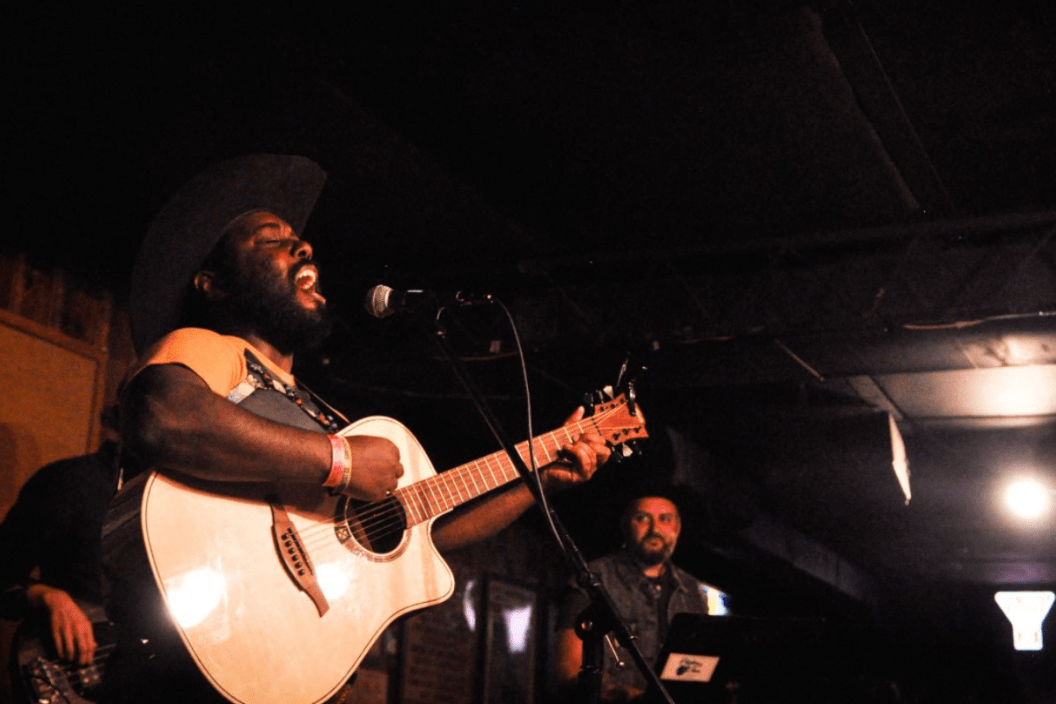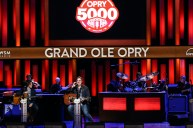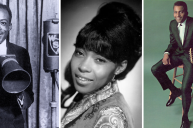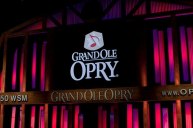Fed up with how country music didn't seem to love her back in the same way that she loved it, Holly G. launched the Black Opry, a blog for Black country artists in April 2020. In the months that followed, the Black Opry transformed from a blog into a full-fledged musical community that to this date shows no signs of slowing down.
Holly says the Black Opry, also led by fellow fan Tanner D., opened the floodgates for her to all of the people of color and other diverse voices making country music that hadn't been getting a fair shake from the industry's powers that be.
"What I found out is that there's a lot of Black artists making country music," Holly tells Wide Open Country. "I started following what everyone was doing online until we all met for the first time at AmericanaFest 2021. That led to the Black Opry blossoming into what it is now with a touring collective of artists that we take out of the country."
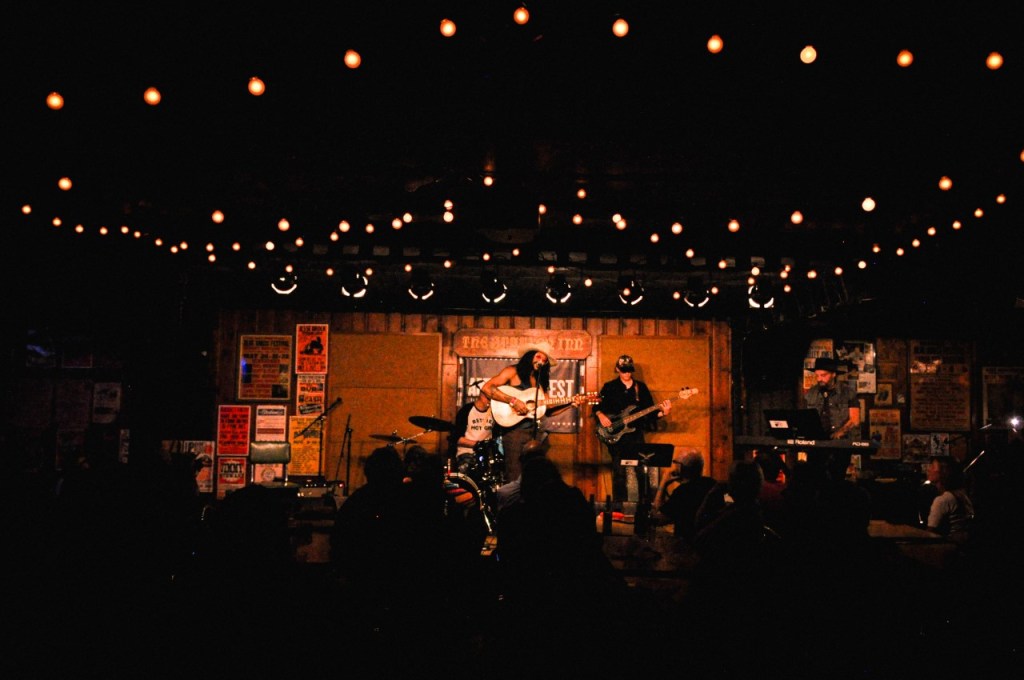
Gabriel Barreto courtesy of Black Opry
After its grand reunion at AmericanaFest, the Black Opry began expanding rapidly when Lizzie No, an early performer with the Opry, needed a fill-in for opening support on a show of hers at New York City's Rockwood Music Hall. She reached out to Holly about organizing a songwriter round of Black Opry artists, aptly called the Black Opry Revue, and within 20 minutes Holly had six artists ready to go. The reception to the show was great, leading to over 60 Black Opry Revue shows since everywhere from Texas to California, Kentucky and soon, the 15th annual Cayamo cruise in February 2023.
Holly says her goal is that the Black Opry Revue shows will lead to more individual opportunities for each artist, planting seeds of change that will permeate throughout their careers and the entire industry at large.
"The top 100 white artists making country music are the ones getting all the opportunity, people calling them, award show nominations, festival gigs and so on," says Holly. "But the top 100 Black country artists were unknown to most people, so we've taken it upon ourselves to find and shine a light on them. It's given us this huge pool of talent that nobody else is tapping into. Our hope is that people will see them with us and that they'll start booking them on their own."
One of those artists that Holly and the Black Opry have shined a light on is Jett Holden, a Nashville by way of California country artist who was about to give up on his musical ambitions until he connected with Holly on Instagram just before the Black Opry launched.
"She reached out after seeing a rough video I'd just posted of my song 'Taxidermy' and wanted to know where she could find more of my music," says Holden. "I told her that I didn't have music anywhere else to find. She then told me that together we were going to change that before pulling me into the fold."
Immediately after joining forces with Holly, Holden began to see a turning of the tide. Holly promptly introduced him to Apple Music's Color Me Country host Rissi Palmer, which led to him receiving her "Color Me Country" grant that helped fund his recording of "Taxidermy." He was also introduced by Holly to Hunter Kelly, host of Apple Music's Neon Songbook Radio, who helped him record his original "Necromancer" and a Spice Girls cover.
All of this has led Holden, who at the time of being discovered by Holly was working at an AT&T call center in California with his hopes of a music career running on empty, to now being a full-time musician freed from the shackles of his mundane, cookie cutter job.
"I'm happy that Holly found me because I literally don't know where I'd be without her," says Holden. "I'd probably be in the same trailer with the same call center job. I'm glad that she didn't give up on me because I had already given up on myself. I hope Holly continues doing the great work that she is because she's changing lives."
A few months after Holden celebrated becoming a full time musician, the Black Opry held a party of their own to celebrate one year of the Black Opry, which was held at City Winery Nashville in April in partnership with CMT. The black tie affair was hosted by local comedian Joshua Black and Holly and included performances from over a dozen artists including Black Country Music Association co-founder Frankie Staton, The Kentucky Gentlemen, SistaStrings, Roberta Lea, Aaron Vance and Holden.
Per Holly, the intention of the anniversary show was to celebrate all the work done by artists of color and other marginalized folks in their community over the past year that the country establishment hasn't shown an interest in celebrating.
"We don't get the same opportunities to dress up and go somewhere as the mainstream country music audience and industry does because they already have award shows celebrating them," says Holly. "Nobody was doing that for us, so we made it an event with a red carpet where we dressed up and took things very seriously while celebrating everyone in our community doing great things."
However, for Holly and the Black Opry, April's anniversary show was just the tip of the iceberg. In June 2022 she, along with Lea and Holden, were invited onto The Kelly Clarkson Show to discuss the Black Opry's mission, accomplishments to date, vision for the future and to perform a couple songs. This was followed in July by the Black Opry's maiden appearance at America's oldest music festival, the Newport Folk Festival, where they were welcomed with open arms.
"Newport has done the work for a very long time to make their stages diverse, so there was little surprise to see us there," says Holly. "A lot of times we go places and people are shocked by our presence. That was the first time we walked into a space and nobody was surprised to see us there. Everybody was excited, welcomed us and treated our artists like celebrities."
Despite all of their accomplishments thus far, Holly and the Black Opry are far from satisfied and won't be until there's proper equity, representation and accountability throughout the country music industry. Holly says that while the Opry has found success, there's still a misconception about that actually leading to tangible progress within the industry. There's still very few marginalized artists in country music that are receiving award show nominations and prime performance slots, and that likely isn't going to change until programmers at country radio stations take notice and start better reflecting their audience in the music they play.
"The problem in country music is that so much of success ties back to radio play and nobody there is budging," says Holly. "Still less than 1% of artists played on country radio are artists of color. I naively made it a goal when I founded the Black Opry to get a Black artist to No. 1 on country radio, but I've since realized it's nearly impossible if you don't have a bunch of money behind you. The people with those assets and control are very picky with where they place it, which is usually with white men. Until we can get those folks to budge nothing is going to change."
Even with the hurdles that have stood in their way, Holly and the Black Opry have shined as trailblazers over the past year and a half as they continue to build their own, all inclusive table for country music where everyone is welcome. They plan to continue doing so into the future as well, as evidenced by a recently announced seven month artist residency in partnership with Philadelphia radio station WXPN that's being funded through a Pew Grant. She also announced at AmericanaFest an upcoming Black Opry collaboration with The Roots as well.
Holly's persistence has been aided by folks like Rissi Palmer and Andrea Williams, a freelance writer and New York Times bestselling artist, both of whom she's leaned on for advice during times both good and bad.
"Rissi and Andrea have been so gracious, open, available and supportive," says Holly. "I'm not a trained music industry person or journalist and have no history in activism, this is all something that just happened organically out of my frustrations with the landscape of country music. All of these things happening and opportunities we're getting to help create this change, I've had to learn as I go. It's been very daunting to navigate at times, so to be able to fall back on them as resources has been a lifesaver for me since there's not many people in the industry doing what we are to compare notes with."
READ MORE: Jake Blount Rediscovers His Roots Inside the Dystopian Future of 'The New Faith'
